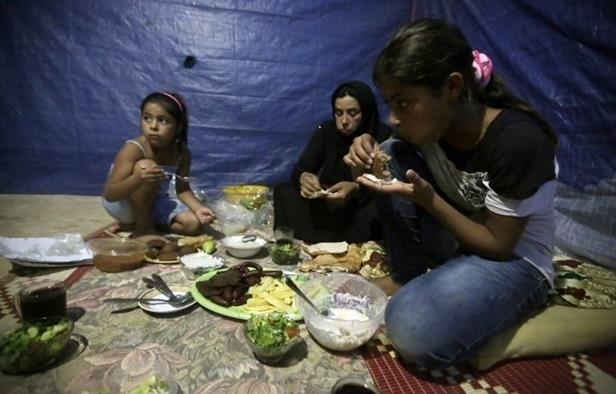At the final stretch of the Lebanese portion of the Beirut-Damascus highway, between the villages of Bar Elias and Masnaa in the eastern fringes of the rural Beqaa Valley, almost every other shop has the word “Sham” (which can mean both “Damascus” and “Syria”) in its name. And, aptly enough, nearly every person here these days is Syrian, most of them refugees from the brutal war raging just a few kilometers away on the other side of the snow-capped Anti-Lebanon mountains.
Cut off from their livelihoods at home, many of them have opened small businesses – mostly restaurants, grocery stores, and cheap goods outlets – almost invariably without obtaining legal licenses. Having operated for months without disturbance from the Lebanese authorities, these small enterprises will now face closure from next week, according to a government announcement Tuesday, in a move that coincides with a wider crackdown on Syrian refugees, including stricter measures at border crossings. Speaking to AFP Thursday, Caretaker Economy Minister Nicolas Nahhas said the 377 identified refugee-owned businesses in Lebanon were creating “unfair competition,” and that Syrians in Lebanon did not have the right to work in “business and commerce.”
Though most Syrian business owners NOW met in the area on Thursday insisted they had licenses – claims of which their neighbors were quietly skeptical – they were nevertheless unhappy with the government’s decision.
“What’s the reason for this? Give me a reason!” said a cell phone accessories store owner, who preferred not to be named. His tone was not so much angry as genuinely confused: “Are we really harming the economy? Does it really hurt the Lebanese for us to be here as Syrians, selling to other Syrians, keeping to ourselves?”
Others, too, dismissed the idea that their presence was undermining the Lebanese economy.
“They say we’re stealing Lebanese jobs, but we’re doing manual labor work that the Lebanese don’t want to do anyway, and we’re only here in the first place because of the war back at home,” said a restaurant employee.
Everyone NOW spoke to agreed the financial burden was the key factor discouraging the refugees from obtaining licenses.
“It can cost $1,000 a month or more to get a license, and most of these places don’t make more than $200 a month,” said a grocer.
“Even without paying for licenses, most of our businesses only stay open for a month or two before going broke and closing down,” said a baker. “Many have already returned to Syria – better to be killed there than die of hunger here.”
Some, however, merely shrugged off the news, saying they doubted the government would carry out its pledge.
“It’s well-known that all restaurants in Bar Elias are Syrian-owned, operating without licenses,” said a restaurateur from Homs, who admitted to not having a license himself. “The previous owner of this one told me that State Security came to him once and told him to get a license, but they never came back again to check if he did.” If the government really did close him down this time, he said, he would simply move and start another business elsewhere.
Analysts NOW spoke to shared the refugees’ scorn for the notion that the coming crackdown is driven by economic concerns, saying instead the government is responding to political pressures pertaining to Lebanon’s notoriously delicate power-sharing arrangements between sectarian communities.
“I don’t buy the claim that the refugees are cutting into Lebanese business,” said Dr. Hilal Khashan, professor of political science at the American University of Beirut. “The reason is political […] remember these are Sunni Muslims for the most part, and Lebanese are very sensitive to demographic numbers. Lebanon proved to be inhospitable to Palestinian refugees, mainly because they are Sunni, and here you have an even larger influx of Sunnis.” From the perspective of sectarian opponents, therefore, “this threatens to tip the demography in favor of the Sunnis.”
Nor does Khashan expect such tensions will alleviate any time soon.
“Initial expectations were that the Syrian conflict would not last long and these refugees would soon be returning to Syria. As it happened, the influx has increased steadily, and it seems that this conflict does not have an end in sight.”
......


